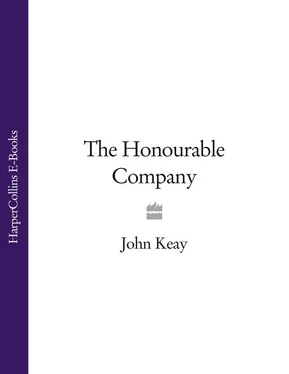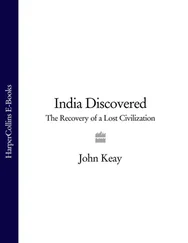This struck a present fear into the hearts of all men so that the best of us and most experienced knew not what to do. And specially, seeing ourselves in such a tempestuous sea and so stormy a place so that I think there be few worse in all the world. Now our ship drove up and down in the sea like a wreck so that sometimes we were within three or four leagues of the Cape Buena Esperanza [Good Hope], then cometh a contrary wind and drove us almost to forty degrees to the southwards into the hail and snow and sleetie cold weather. And this was another great misery to us that pinched exceeding sore so that our case was miserable and very desperate.
All this time the Hector kept company with the Red Dragon, standing by to take off survivors when it became necessary. A lull in the storms prompted an attempt to improvise a new rudder by using the mizzen mast as a sweep. It failed and the weather again worsened. This time the men were all for abandoning ship. But their commander stood firm and to quell any further ideas of desertion, sent orders to the Hector to leave them immediately and head for England. He also enclosed a note to his employers advising them of his situation and prospects. He would try, he said, to save his ship. He thought there was a good chance and that was why he was risking his life and the lives of his crew. ‘But I cannot tell where you should look for me if you send out any pinnace to meete me.’ Rudderless and undermanned, he might end up anywhere. ‘I live’, he explained, ‘at the devotion of the wind and seas.’
Next day the Hector was seen to be still keeping her station a couple of miles away and carrying little sail. Observing this flagrant disregard of orders Lancaster was clearly moved. ‘These men regard no commission’, he muttered in a celebrated aside which, like his ‘devotion to the wind and seas’, would be remembered long after names and dates and places were forgotten. Of such sentiments myths are made and to an enterprise as ambitious and enduring as the East India Company myths would matter.
With the help of the Hector’s crew a second attempt was made to rig a makeshift rudder. This time it held; so did the weather. On 16 June, after nearly four months out of sight of land, the two ships approached St Helena ‘at the sight whereof there was no small rejoicing among us’. Three weeks of resting, refitting, and replenishing their provisions with the island’s then plentiful stocks of wild goat were followed by an uneventful voyage back to England. They anchored in the Downs on 11 September 1603 ‘for which thanked be Almightie God who hath delivered us from infinite perils and dangers in this long and tedious navigation’.
CHAPTER TWO This Frothy Nation
THE SPICE RACE
So Lancaster’s fleet had reached the East Indies and returned without losing a single ship. It was no small achievement. Valuable experience of the eastern seas had been acquired and something had been learnt of the complexities and potential of the eastern carrying trade. More tangibly a factory with adequate trading capital had been left at Bantam while in London nearly 500 tons of peppercorns were soon being laboriously transferred from the Red Dragon to the Company’s warehouse. A handsome profit was expected and the Company’s future looked promising. Lancaster had earned the nation’s gratitude. James I, who had succeeded Elizabeth earlier in the year, rose to the occasion by rewarding him with a knighthood.
But though a success, the Company’s first voyage had been no sensation. For one thing it had failed to make direct contact with the clove islands, thus giving the Dutch two more crucial years in which to make good their claim to succeed to the Portuguese monopoly. Then there was the question of economics. Already there were those who failed to see how exchanging precious bullion for an inessential condiment like pepper could possibly be in the national interest; they likened the Company to the gullible native of Central America who supposedly congratulated himself on acquiring pretty beads and funny toys in exchange for boring old gold and silver; their numbers would swell with every voyage. But to a benign commander like Lancaster it was the loss of 182 men, two-fifths of his entire following, that rankled. Here was a less equivocal drain on the nation’s resources and one which even lemon juice had failed to staunch.
In the hard-nosed estimation of his fellow directors an even greater source of anxiety was the unfortunate effect that discharging a million pounds of pepper was having on the London market. A dip in prices was anticipated, but it so happened that in late 1603 the King too had come by a large stock of pepper, probably the contents of a captured carrack. His Majesty, as always, had a pressing need for cash and consequently placed an embargo on the Company’s sales until his own stocks had been sold. Naturally the directors protested. A dividend was immediately declared in kind – that is, pepper – and the London market was soon awash with the stuff. Prices halved. Some underwriters would complain that they were still burdened with stocks from the first voyage ‘six or seven years after’.
Had the Company been the brave new venture in joint-stock ownership which it later became, this would not greatly have mattered. After all, the whole point of a company operating on a stock jointly subscribed by its members is that this working capital should be long term, transcending individual ventures and so less vulnerable to the hiccups of the market. But in fact the 218 petitioners who in 1600 had become the Company of Merchants of London trading into the East Indies had subscribed for only one voyage. The majority now wanted their money back; they were not amused when instead they were told that for every £250 they had subscribed, £200 must be reinvested in a second voyage.
From the start the Company’s stock had appealed to two very different types of investor. On the one hand there was the shareholder interested primarily in a quick and substantial return on his investment. He might be anything from a tradesman to a courtier and, as the Company grew, he might entertain ulterior expectations of influence and patronage within it; but he had no obvious interest in the specifics of its trade. On the other hand there were those who perceived some collateral advantage in the trade itself. This group consisted of wealthy and influential City merchants with extensive commercial and financial interests outside the Company. Such interests might coincide with the Company’s upstream requirements, like the supply of bullion and broadcloth for export, of ships and provisions, of sources of finance, or with its downstream requirements like the sale, re-export and distribution of eastern produce.
At the risk of further over-simplification, these two types of investor may be roughly identified with the Company’s two institutional bodies, the General Court (later the Court of Proprietors) and the Court of Committees. The General Court comprised all those with voting rights, the qualification for which in the early seventeenth century was a minimum holding of, usually, £200. It therefore represented the generality of investors amongst whom those interested primarily in profits and dividends predominated. It was also, of course, the supreme authority within the Company. But, several hundred strong, it necessarily met infrequently and had little to do with the day-to-day running of the business.
Under the terms of the original charter this was left to the Court of Committees consisting of the Governor, Deputy-Governor and twenty-four ‘committees’, or directors, all of whom were elected by the General Court. The Court of Committees was the Company’s executive, making policy decisions which had to be ratified by the General Court as well as directing all operations. For specific and recurrent functions like purchasing bullion, timber, provisions, etc., handling correspondence with overseas factors, and managing the Company’s sales it divided into a host of influential sub-committees. Both these and the Court of Committees met frequently. Naturally their work demanded managerial and commercial experience, and so naturally the ‘committees’ were predominantly City merchants.
Читать дальше












